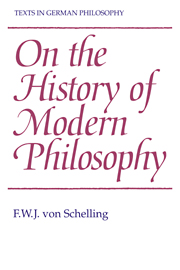Book contents
- Frontmatter
- Contents
- Translator's Preface
- Acknowledgements
- Translator's Introduction
- ON THE HISTORY OF MODERN PHILOSOPHY [Introduction]
- Introduction
- Descartes
- Spinoza, Leibniz, and Wolff
- Kant, Fichte, and the System of Transcendental Idealism
- The Philosophy of Nature (Naturphilosophie)
- Hegel
- Jacobi and Theosophy
- On National Differences in Philosophy
- Index
Jacobi and Theosophy
Published online by Cambridge University Press: 05 June 2012
- Frontmatter
- Contents
- Translator's Preface
- Acknowledgements
- Translator's Introduction
- ON THE HISTORY OF MODERN PHILOSOPHY [Introduction]
- Introduction
- Descartes
- Spinoza, Leibniz, and Wolff
- Kant, Fichte, and the System of Transcendental Idealism
- The Philosophy of Nature (Naturphilosophie)
- Hegel
- Jacobi and Theosophy
- On National Differences in Philosophy
- Index
Summary
JACOBI
If empiricism alone were to be sufficient in philosophy, then the highest concept, i.e. the concept of the highest being (Wesen) would have to be given to us, by experience alone, at the same time as the existence of that being. Various possibilities offer themselves here. May we consider it possible that the concept and with it the existence of the highest being should be given by immediate experience? Immediate experience is either outer or inner experience. But how could a concept, which is always a matter for the understanding, be given by outer experience? Obviously only by a fact or an effect which immediately affects our understanding. But an outer effect which immediately makes claims on our understanding, and thus also has an immediate effect upon it, can only be doctrine, teaching. The highest concept would have to be given to us by a doctrine which comes to us from outside, indeed a doctrine of irrefragable, irresistible authority, and as such an irresistible authority could only be ascribed to that doctrine which came from the highest being Himself (for the highest being alone is the unchallengeable authority with regard to Himself), then the highest concept would have to be given to us by a doctrine which could be traced back in its last source to the highest being Himself. This tracing could only happen historically. Besides, if an external authority is assumed as the highest principle of philosophy, then only two things can be thought.
- Type
- Chapter
- Information
- On the History of Modern Philosophy , pp. 164 - 185Publisher: Cambridge University PressPrint publication year: 1994



